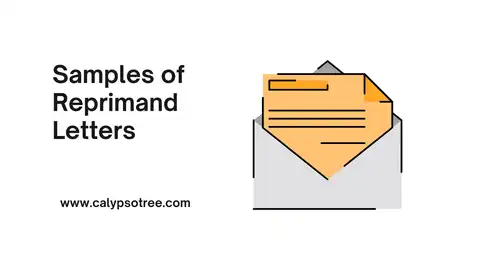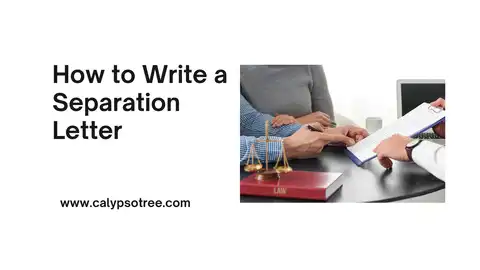Explanation Letter to USCIS Sample – Do you need to write an explanation letter to USCIS? It is a group that helps people move to a new country. Writing a letter to them can seem hard, but don’t worry! This guide will help you. We will show you what to put in your letter and how to make it look nice. Let’s get started!
What Is an Explanation Letter to USCIS?
An explanation letter to USCIS is a special letter you write when you need to tell them more about something. It’s like a note to your teacher explaining why you didn’t do your homework but for important things like moving to a new country.
How to write an explanation letter to USCIS
Writing an explanation letter to USCIS is essential to various immigration application processes. This letter provides necessary information and helps clarify any uncertainties.
Here’s how you can write an effective explanation letter.
Start with Basic Information
- Your Full Name: Write your full name at the top of the letter.
- Your Address: Include your current address.
- Date: Remember to put the date you are writing the letter.
- USCIS Address: Include the appropriate USCIS address.
Include a Subject Line
The subject line helps USCIS know what your letter is about. It might be something like:
- Re: Explanation for late filing of Form I-485
- Re: Additional information for Petition I-130
- RE: Response to Notice of Intent to Deny
Explain Your Situation
It is the main part of your letter where you must explain the situation in detail. Keep it simple and direct.
Use List Tables
Use tables to organize information if needed. For example:
Provide Evidence
Attach copies of documents that support your explanation.
Use Simple Language
Write in a way that’s easy to understand. Remember, this letter might be read by someone who doesn’t know your situation.
End with a Polite Closing
Thank your reader, and end with something like:
- Sincerely,
- Your Full Name
- Your Signature
Sample Letter
Here’s an explanation letter to USCIS sample:
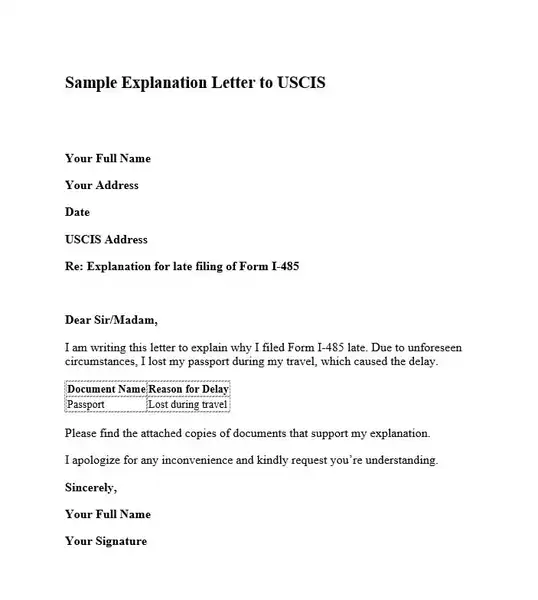
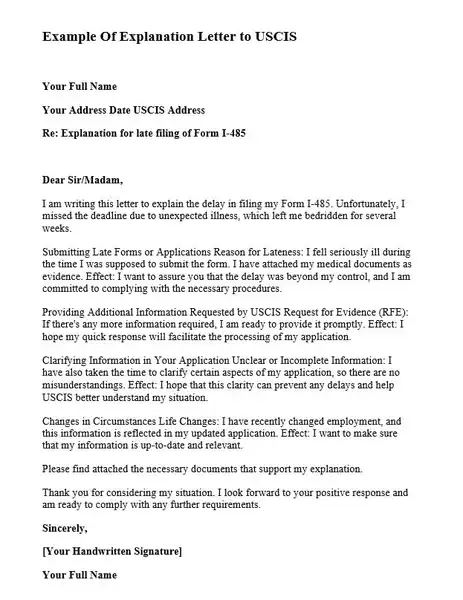
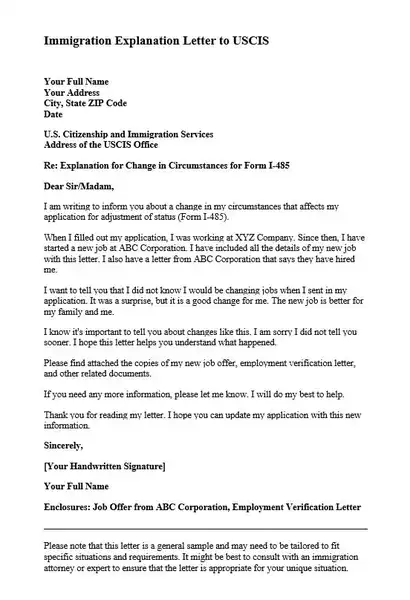
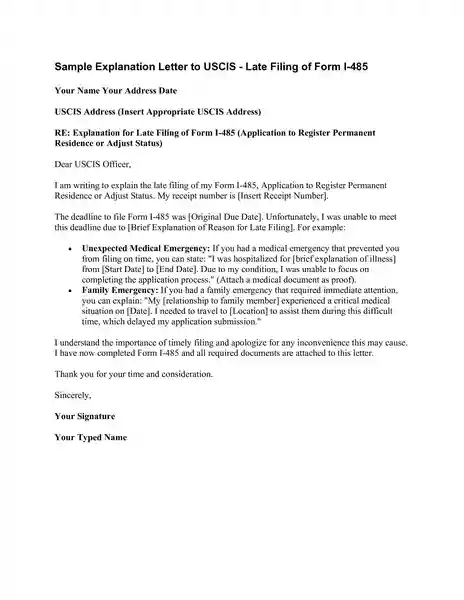
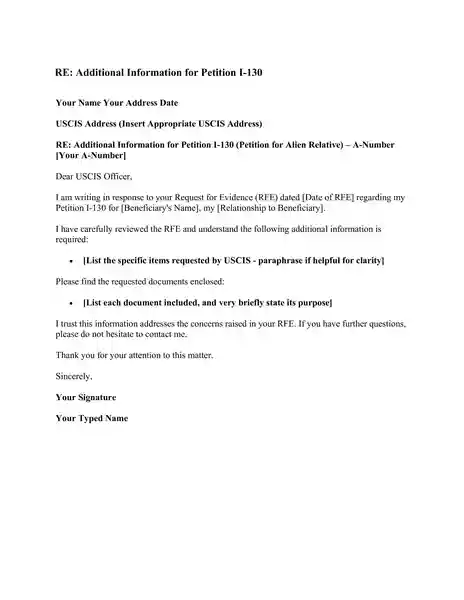
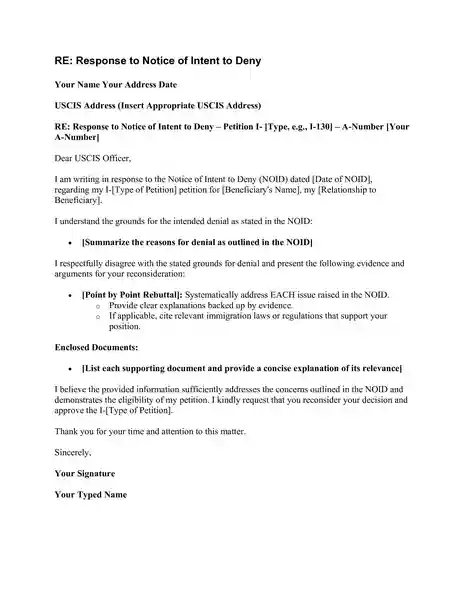
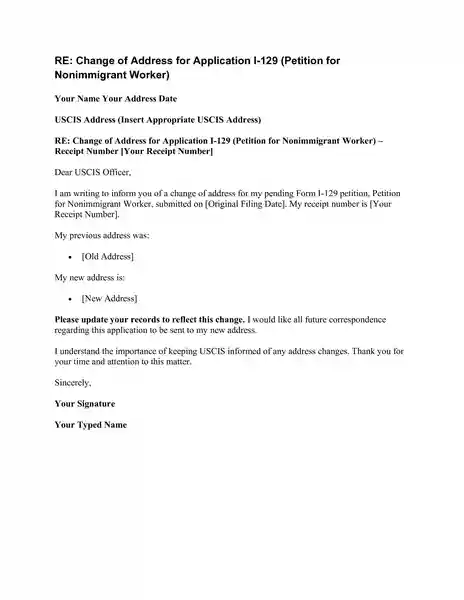
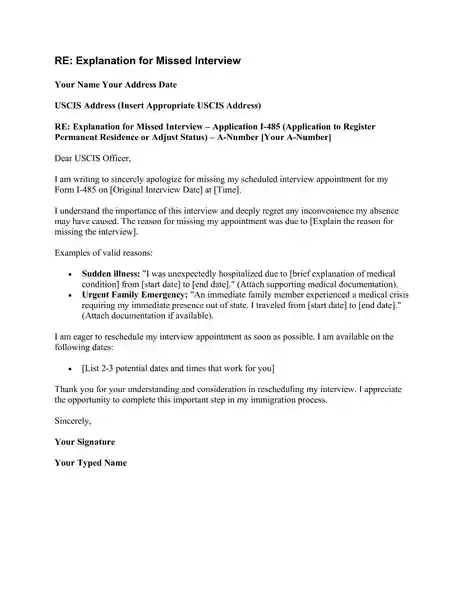
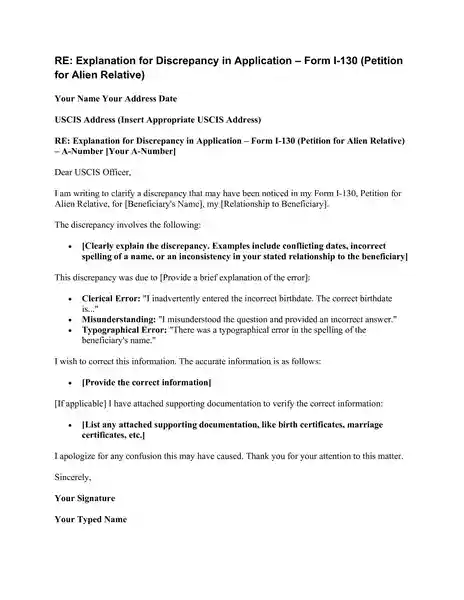
When Do You Need to Write an Explanation Letter?
You might have to write a letter like this for different reasons. Here’s what some of them might be:
Submitting Late Forms or Applications
- Why You Were Late: Tell them why you missed a deadline. Maybe you were sick, or you lost some papers.
- What It Does: Telling them why helps them understand it wasn’t your fault.
Providing Additional Information Requested by USCIS
- What They Want to Know: Sometimes, they need more information from you.
- What It Does: Giving them the information they ask for helps them work on your case faster.
Responding to a Notice of Intent to Deny (NOID)
- What’s Happening: They will tell you if they might refuse your application. You must explain why they shouldn’t.
- What It Does: A good letter might help them say yes instead of no.
Clarifying Information in Your Application
- What’s Wrong: If something in your application isn’t clear, you must clarify it.
- What It Does: This helps them understand better, so there are no delays.
Changes in Circumstances
- What’s Changing: Big changes in your life, like getting married or a new job, must be explained if they change your application.
- What It Does: Telling them about these changes keeps everything correct and up to date.
Other Specific Requests from USCIS
- Special Questions: Sometimes, they might have extra questions for you that don’t fit into the usual areas.
- What It Does: Answering these special questions shows you’re working with them and helps your application go smoothly.
Writing an explanation letter to USCIS can tell them more about your situation. It’s like having a conversation with them on paper.
How Should You Format the Letter?
Formatting the letter helps the reader understand your points and shows that you take the process seriously. Here’s a more detailed look at each part of the letter:
Introduction
- Your Full Name and Address: Start the letter with your full name and address in the top-left corner.
- Date: Write the date you’re sending the letter below your address.
- USCIS Address: Write the USCIS address that corresponds to your case.
Subject Line
- Relevant Information: Include a subject line briefly stating the letter’s purpose. For example, “Re: Explanation for late filing of Form I-485.”
- Effect: This helps the reader quickly understand what the letter is about.
Body of the Letter
- Opening: Start with a polite greeting, like “Dear Sir/Madam.”
- Main Content: Break down your explanation into short paragraphs. Use simple language that’s easy to understand.
- List Tables (if needed): If you need to present information clearly
- Evidence (if applicable): If you provide evidence, mention it in the letter and attach it separately.
Closing the Letter
- Closing Remark: Use a polite closing like “Sincerely” or “Thank you.”
- Your Full Name: Write your full name below the closing remark.
- Signature: Include your handwritten signature above your typed name.
Additional Tips
- Use a Formal Tone: Keep your language polite and formal.
- Check for Spelling and Grammar: Proofreading the letter helps avoid mistakes.
- Use Standard Font and Size: Choose a standard font like Times New Roman and a regular size like 12.
The Benefits
Writing an explanation letter to USCIS (U.S. Citizenship and Immigration Services) has several benefits.
Clarification of Information
- What It Means: Sometimes, the form information might need clarification or completion. An explanation letter assists you in explaining something.
- Benefit: It helps USCIS understand your situation better, preventing any misunderstandings.
Providing Additional Details
- What It Means: If USCIS needs more information about something, you can provide it in an explanation letter.
- Benefit: Giving extra details can help your application move along more smoothly.
Explaining Special Circumstances
- What It Means: Life is full of surprises, and sometimes things happen that need to be explained, like why a document is missing, or something was late.
- Benefit: This shows USCIS that you’re not hiding anything and that there were real reasons for any problems.
Responding to Requests from USCIS
- What It Means: USCIS sometimes asks you specific questions or requests more information.
- Benefit: Responding quickly and clearly with an explanation letter can help your application get processed faster.
Showing Responsibility
- What It Means: Writing a well-crafted explanation letter shows that you are taking the immigration process seriously.
- Benefit: It makes a positive image and indicates that you’re responsible.
Reducing Delays
- What It Means: If something is unclear, it might cause delays in processing your application.
- Benefit: A clear explanation letter helps everything move faster by clearing any confusion.
Preventing Denials
- What It Means: In some cases, USCIS might deny an application if something is unclear or information is missing.
- Benefit: You can prevent a denial by explaining everything clearly in a letter.
Creating a Record
- What It Means: Your explanation letter becomes a part of your official record.
- Benefit: If there are any future questions about your application, the letter shows what happened.
Common Mistakes In Explanation Letter to USCIS
Here’s a list of common mistakes.
Writing in an Informal Tone
- Mistake: Use casual language, like you’re talking to a friend.
- Why It’s a Problem: USCIS expects a formal and respectful tone.
- Solution: Use polite words and formal greetings, like “Dear Sir/Madam.”
Providing Incomplete or Inaccurate Information
- Mistake: Leaving out details or giving wrong information.
- Why It’s a Problem: This can cause confusion and delays.
- Solution: Check all your information carefully and make sure it’s complete.
Not Responding to Specific Requests
- Mistake: Ignoring questions or requests from USCIS.
- Why It’s a Problem: USCIS needs certain information to process your application.
- Solution: Read all requests carefully and respond to them fully.
Using Complicated Language
- Mistake: Writing in a way that could be easier to understand.
- Why It’s a Problem: It makes it difficult for the reader to understand your point.
- Solution: Use simple and clear language.
Lack of Organization
- Mistake: Jumping around between topics without a clear structure.
- Why It’s a Problem: It must be clarified for the letter.
- Solution: Organize your letter with headings and short paragraphs.
Failure to Include Supporting Evidence
- Mistake: Not including documents that support your explanation.
- Why It’s a Problem: USCIS might only accept your explanation with evidence.
- Solution: Attach copies of any relevant documents.
Sending to the Wrong Address
- Mistake: Sending your letter to the wrong USCIS office.
- Why It’s a Problem: This can cause serious delays in processing.
- Solution: Check the correct address for your specific case and use it.
Handwriting that is Difficult to Read
- Mistake: If you write the letter by hand, use messy handwriting.
- Why It’s a Problem: It might be hard for USCIS to read your letter.
- Solution: Type the letter or write it very neatly.
You can create a clear, effective, professional letter by avoiding these common mistakes. Read Also: 60 Best Letter of Recommendation Example & Template
Expert Insights
“When writing an explanation letter, focus on facts and be concise. Avoid emotional language and always attach supporting evidence.” – [Name of immigration attorney or qualified representative]
USCIS Contact Information
- Website: uscis.gov
- National Customer Service Center: 1-800-375-5283
- Find a USCIS Office: [Link to office locator on USCIS website]
Glossary of Terms
- A-Number: Alien Registration Number, assigned to non-citizens.
- NOID: Notice of Intent to Deny, an official USCIS notice indicating an application may be rejected.
- Petitioner: The person filing an immigration petition for someone else (often a U.S. citizen or resident).
- Beneficiary: The person who would benefit from an approved petition (the immigrant).
Conclusion
Writing an explanation letter to USCIS is a big job, but you can do it! This guide has shown you how to tell them what you need to say. Just remember to keep it simple and clear. If you use what you learned here, your letter will be just right. And if you need help, you can always ask someone who knows about these letters. Now you know how to write a letter, and it’s your turn to try! Good luck!
FAQs
Can I Use List Tables in the Letter?
Yes, you can use list tables to organize information.
What Should I Do If I Need Help With How to Write the Letter?
If you’re not sure how to write the letter, it might be wise to consult with an immigration lawyer or seek help from someone who has experience with immigration matters.
Should I Include Evidence with My Letter?
Yes, it’s often a good idea to include copies of documents that support your explanation.
Can I Write the Letter by Hand?
While it’s usually best to type the letter to ensure it’s easy to read, you can write it by hand if necessary. Just make sure it’s neat and clear.
How Do I Send the Letter to USCIS?
You should send the letter to the appropriate USCIS address that handles your type of application or petition. It’s often recommended to send it via certified mail.
What Happens If I Don’t Send the Explanation Letter?
Please send the explanation letter when required to ensure timely application processing and avoid denial.

Daniel Wilson Is a Seasoned communications professional and letter-writing expert. With over a decade of experience in corporate and non-profit sectors, Has developed a deep understanding of the power of effective communication.
Specializes in creating versatile letter templates that can be tailored to any situation. In this blog, Daniel shares a passion for the art of letter writing, offering practical tips, customizable templates, and inspiring ideas to help you communicate with clarity, confidence, and impact.







